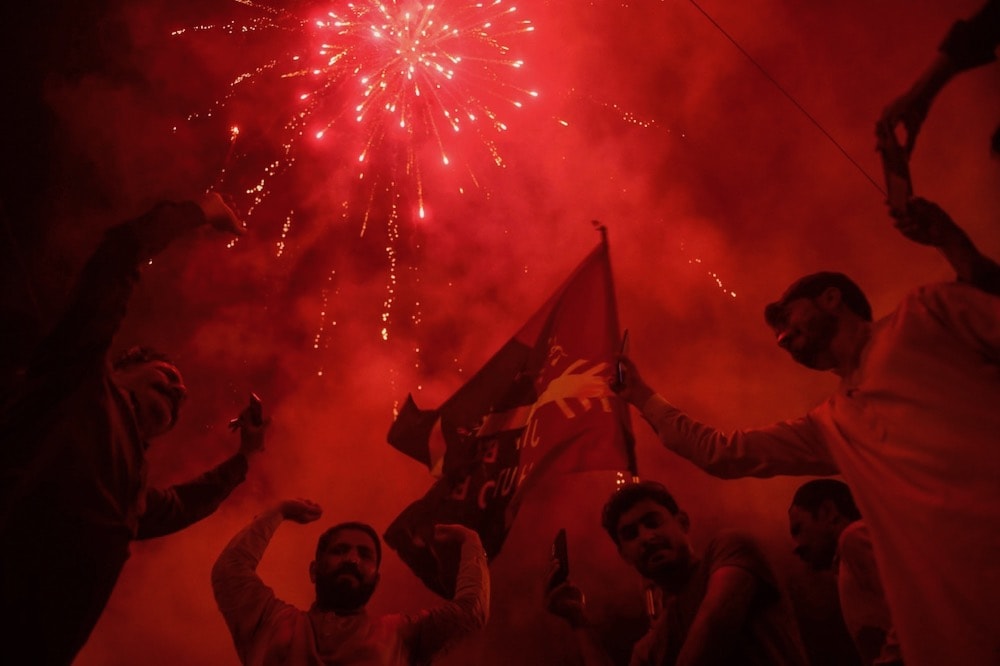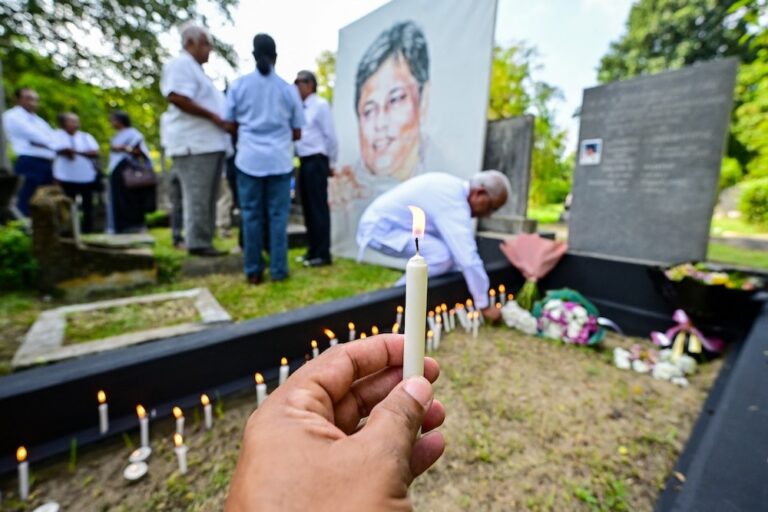April 2022 in Asia-Pacific: A free expression round up produced by IFEX's regional editor Mong Palatino, based on IFEX member reports and news from the region.
South Asia’s civic space is on fire: Massive protests in Sri Lanka, rising anti-Muslim violence in India, continuing crackdown in Kashmir, and intensifying political conflict in Pakistan. In the Philippines, Nobel laureate Maria Ressa countered the latest government harassment with a legal pushback.
Information restrictions during Sri Lanka protests
Massive protests were organized in Sri Lanka as the country experienced its worst financial crisis since gaining independence in 1948. Protesters blamed President Gotabaya Rajapaksa for mishandling the economy, which led to fuel shortages and the higher cost of essential goods. A state of emergency was declared on 1 April to curb protests, followed by the blocking of social media platforms the following day. Reporters Without Borders (RSF) has monitored at least nine journalists who were attacked or harassed by the police and injured during protests. The Free Media Movement issued a statement condemning the “anti-democratic actions taken by the government to stifle dissent and quell the voices of the people affected by its gross failure at managing the country’s economy.” Despite the repressive measures imposed by authorities, protests snowballed as more people demanded the resignation of the president. Peaceful protests across the country mobilized thousands and gathered people from different ethnic and religious backgrounds.
Pakistan: Political crisis and violence against media
News about the Islamabad High Court striking down the Prevention of Electronic Crimes (Amendment) Ordinance, 2022 (PECA) for being unconstitutional was shared during the same week Pakistan’s Prime Minister Imran Khan was removed from power by Parliament. Khan’s ouster reflects the intensifying political crisis in the country, while the court decision on PECA could signal a positive development for media freedom. The Pakistan Press Foundation (PPF) described the ruling as “a major step forward in creating a fair and free environment for the Pakistani media.”
For a deeper dive into the ramifications of PECA over the years, check out this comprehensive article by Kunwar Khuldune Shahid.
Meanwhile, several members of the former ruling party, Pakistan Tehreek-i-Insaf (PTI), are facing threats of arrests for criticizing the military and the new government. Digital Rights Foundation (DRF) reminded officials to focus on repealing laws that are used to stifle freedom of expression. “It has long been our principled position that state institutions and public officials should not be insulated from criticism and should not weaponise laws and law enforcement bodies to silence their critics.”
Some leaders of PTI lashed out against the media for allegedly supporting the “foreign conspiracy” to expel the former ruling party. There were incidents of harassment and online violence targeting journalists and columnists. PPF urged PTI officials to condemn the violence and caution its members to exercise restraint during heightened political tension.
Crackdown continues in Kashmir
Authorities in the Indian-administered Jammu and Kashmir region continue to impose repressive and arbitrary measures, which include the filing of criminal cases against journalists.
SFLC.in shared a government report confirming that internet shutdowns in Kashmir have been enforced on a daily basis during the last quarter of 2021 as part of official countermeasures against terrorism. This prolonged blocking of the internet has disrupted the lives of citizens and the delivery of services in the territory.
Journalists remain at risk for simply doing their work. The office of news portal Kashmir Walla was raided, as well as the home of a former contributor, Abdul Aala Fazili, who was arrested for writing an opinion piece in 2011 about Kashmir independence. Fahad Shah, editor of Kashmir Walla, was arrested earlier, in March.
Another recent example of the hardline policy towards journalists in Kashmir was the rearresting of journalist Aasif Sultan, who has been in detention since 2018, under the 1978 Jammu and Kashmir Public Safety Act – just five days after being granted bail.
Anti-Muslim violence in India
In an April post, Global Voices explores the rise in narratives propagating anti-Muslim sentiment in India. Communal violence and riots erupted in several cities during the celebration of Hindu festivals. There were reports that state-backed Hindu nationalists attacked Muslim shops and houses during the festival which led to mob violence. There has been a disturbing surge of anti-Muslim activities in recent years, especially in areas controlled by the ruling Bharatiya Janata Party. The hashtag #StopBulldozingMuslimHouses trended on Twitter after authorities demolished illegal street structures, but it became obvious that they were targeting properties owned by Muslims. Writer Sanjukta identifies those responsible: “Most of this anti-Muslim propaganda has been carried out by right-wing Hindu nationalists on mainstream media TV channels, social media and on the streets with tacit or explicit support from state actors, including the judiciary.”
From dress codes to arrests: Challenges facing Afghanistan media
RSF has sent a letter to Richard Bennett, the UN’s new special rapporteur on the human rights situation in Afghanistan, about the deteriorating press freedom situation in the country and the need to stop the arbitrary arrests targeting journalists. RSF noted that new restrictions include an information and culture ministry decree banning privately-owned TV channels from retransmitting news programs provided by international broadcasters, that violate the dress code for women news presenters.
“As the regime continues to arrest journalists and step up pressure on the media, the press freedom situation in Afghanistan must not pass under the radar of the international community’s attention,” said RSF advocacy and assistance director Antoine Bernard.
Based on the report of the Afghanistan Journalists Center and the Afghan Independent Journalists Association, at least 117 cases of violence against journalists and media, including the murder of four journalists, were documented from March 2021 to March 2022. The report also shows that media-related attacks have worsened in the last seven months, with at least 66 instances of violence directed toward journalists. Because of the increasing difficulties faced by media, hundreds of journalists have left the country since August 2021 and over 224 media outlets have shut down their operations due to funding shortage and government restrictions.
Maria Ressa pushes back against red-tagging
Nobel laureate Maria Ressa filed an administrative complaint with the Philippine Ombudsman’s office against communications undersecretary Lorraine Badoy, who has repeatedly called the Filipino-American journalist an “enemy of the state” and accused Rappler of being an “ally and mouthpiece” of the armed communist movement. Ressa joined other concerned citizens who had earlier filed similar complaints against Badoy for red-tagging opposition leaders and activists. In the Philippines, red-tagging is considered harmful because it often leads to human rights violations.
After winning the Nobel Peace Prize in December, Ressa and her news company continued to face government intimidation. A Cabinet member of the Rodrigo Duterte government sued Ressa, Rappler, and other journalists for libel for reporting about a controversial energy deal. Members of a Church group, whose leader has close ties with Duterte and is currently facing sex trafficking charges in the United States, filed a slew of cyberlibel charges against Ressa and Rappler for publishing reports related to the case. A local prosecutor’s office has already dismissed some of the complaints.
A fact-free election?
The Solicitor General also initiated a petition that led to the cancellation of Rappler’s partnership with the Commission on Elections in launching information and fact-checking activities ahead of the elections scheduled for 9 May. The Hold the Line Coalition Steering Committee has issued a statement condemning the action of the Solicitor General. “The State’s blatant attempts to suppress Rappler’s election-related fact-checking services is an unacceptable attempt to cheat the public of their right to accurate information, which is critical during elections.”
In brief
Around 116 global civil society organizations and 17 gender scholars and activists have signed a statement calling on the new president of South Korea to withdraw his pledge to abolish the Ministry of Gender Equality and Family. They are concerned about the detrimental impact on women’s rights.
The Freedom Cartoonists Foundation and Cartoonists Rights Network International (CRNI) jointly inaugurated the Kofi Annan Courage in Cartooning Award on World Press Freedom Day. It will alternate with CRNI’s Robert Russell Courage in Cartooning Award. Both awards “honor extraordinary contributions to freedom of expression made by editorial and political cartoonists, often despite the most difficult of circumstances.” Kofi Annan is a former UN Secretary General and the recipient of the 2001 Nobel Peace Prize.
And finally, Malaysian artist Fahmi Reza is facing another police investigation for publishing a satirical cartoon. He has been summoned by authorities in the past for artwork deemed insulting to authorities. Malaysia is no friend of satire, as the decades of censorship and harassment of award winning cartoonist Zunar show.



